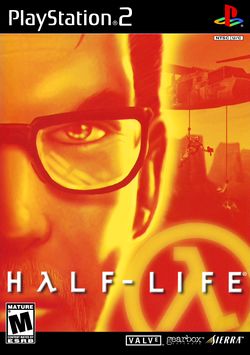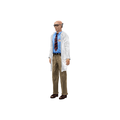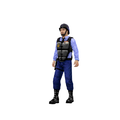Half-Life (PlayStation 2 port)

| |
| Half-Life for PlayStation 2 | |
|---|---|
| Developer(s) | |
| Release date(s) | |
| Genre(s) | |
| Mode(s) | |
| Platform(s) | |
| Rating(s) |
ESRB: M (Mature) |
| Distribution | |
| Input |
DualShock 2 controller, USB keyboard and mouse |
| Engine | |
| Series | |
| Composer(s) |
Ben Houge (main menu music) |
Half-Life for PlayStation 2 is a console port of Half-Life for the Sony PlayStation 2 developed by Gearbox Software with the assistance of Sierra Entertainment and Valve Software.
Contents
Overview[edit]
The most noticeable difference in this port is its improved graphics. The character models are much more detailed, featuring eyes that track movement, facial expressions, and jointed fingers. The levels were also updated and extended based on the work from the Dreamcast port, and most of the bugs were ironed out, making it the most technologically advanced and stable version of the game to date.
The game also features a two player multiplayer deathmatch mode (via split-screen) titled Head-to-Head and a new cooperative expansion called Half-Life: Decay that allowed players to play as the two female scientists Dr. Cross and Dr. Green in Black Mesa.
Development[edit]
The companies began exploring the possibility of bringing the game to the PlayStation 2 as early as November of 1999. Gearbox started making plans for the port with Sony in February of 2000. They received their development kits in early April.[2]
The game was announced by Sierra on November 17, 2000[3] along with a two-player cooperative campaign known as Half-Life: Decay and a four-player multiplayer mode featuring 12 exclusive levels.[4] It was later changed to two-player mode[5] with eight bots.[6] On-line multiplayer did not make the final cut as the console's connectivity options were not available at the time for the developers to implement.[7]
Marc Nagel from Sierra confirmed the game would receive mod support.[8] The only released addon was a port of Half-Life: Uplink released on a PlayStation Underground demo disc in the June 2002 issue of the Official PlayStation Magazine.[8] This can be played using an undocumented cheat code discovered by the project leader of Half-Life: Decay's PC port. When entered, it causes the game to prompt for an expansion disc.
Half-Life: Decay[edit]
Half-Life: Decay is an exclusive multiplayer cooperative mode for the PlayStation 2 port of the game where the players take on the roles of Dr. Gina Cross and Dr. Colette Green. They must work together with the assistance of the science team to seal the rift between Earth and the borderworld Xen.
Differences[edit]
Several key changes from the unreleased Dreamcast port made their way into the PlayStation 2 version, including the movement indicator on the HUD and simplified long jumping, allowing the move to be performed simply by pressing the jump button while in mid-air. The view roll from the original game when strafing left or right returned. A lock-on mechanic, similar to auto-aim from the original game, was introduced. The player can use it to lock on to an enemy and remain focused on it as a target. Brackets are also placed around objects in the game world that the player can interact with. A secret alien mode was added which allows the player to go through the game as a Vortigaunt.
Other versions[edit]
The European version, which was released after the North America release, appears to have updated maps and bug fixes alongside one previously available but now removed easter egg, see the article's Decay section for additional info. Like its PC counterpart, the German version is censored. There is a demo version featuring portions of first three chapters of the game, similar to demo version of Half-Life: Opposing Force.
Trivia[edit]
- There is no autosave feature. The player can quick save and quick load the game from the in-game options.
- A cheat code for the slow motion mode can be found in the Credits menu in the Options.
- According to Jess Cliffe, Half-Life 2: Raising the Bar was to feature a section dedicated to the port, but it was found boring based on external feedback, and was cut to have more space for more interesting content.[source?]
Cheats[edit]
The cheats for the PS2 port are as follows:
- Extras menu (used to launch Half-Life: Uplink)
Code: △⃞←→○✕↑↓
- Alien mode
Code: ↑△↑△↑△↑△
- Infinite ammo:
Code: ↓✕←○↓✕←○
- Invulnerability:
Code: ←□↑△→○↓✕
- Invisibility:
Code: ←□→○←□→○
- Slo-mo:
Code: →□↑△→□↑△
- Xen gravity:
Code: ↑△↓✕↑△↓✕
- Unlocking all Decay missions including secret bonus mission Xen Attacks (requires 2 gamepads):
Code:
| Gamepad 1 | L3 | ↑ | ↑ | ← | → | ✕ | ○ | Start | |||||
| Gamepad 2 | R3 | ↓ | ↓ | ← | → |
Gallery[edit]
The lobby of the Anomalous Materials Laboratory.
See also[edit]
References[edit]
- ↑ 1.0 1.1 Ships Ahoy on Blue's News (November 6, 2001)
- ↑ Randy Pitchford On Half-Life PS2 on Stomped (November 17, 2001) (archived)
- ↑ Valve Announces PS2 Half-Life on Blue's News (November 17, 2000)
- ↑ Half-Life storms towards the PS2 on Games Xtreme (September 18, 2001)
- ↑ Hands-on Impressions on IGN (September 19, 2001) (archived)
- ↑ E3 2001 Hands-on: Half-Life on GameSpot (May 17, 2001) (archived)
- ↑ Interview: Randy Pitchford on Half-Life for the PS2 on 3DActionPlanet (October 11, 2001) (archived)
- ↑ 8.0 8.1 Official PlayStation Magazine, Issue 57 (June 2002)
External links[edit]
- Official website (archived)
- Profile on Official PlayStation website (archived)
- Sony Underground June 2002 demo disc with Half-Life: Uplink for PS2 on Archive.org
 Half-Life for PlayStation 2 - Trailer on YouTube
Half-Life for PlayStation 2 - Trailer on YouTube Half-Life for PlayStation 2 - Trailer on YouTube
Half-Life for PlayStation 2 - Trailer on YouTube










